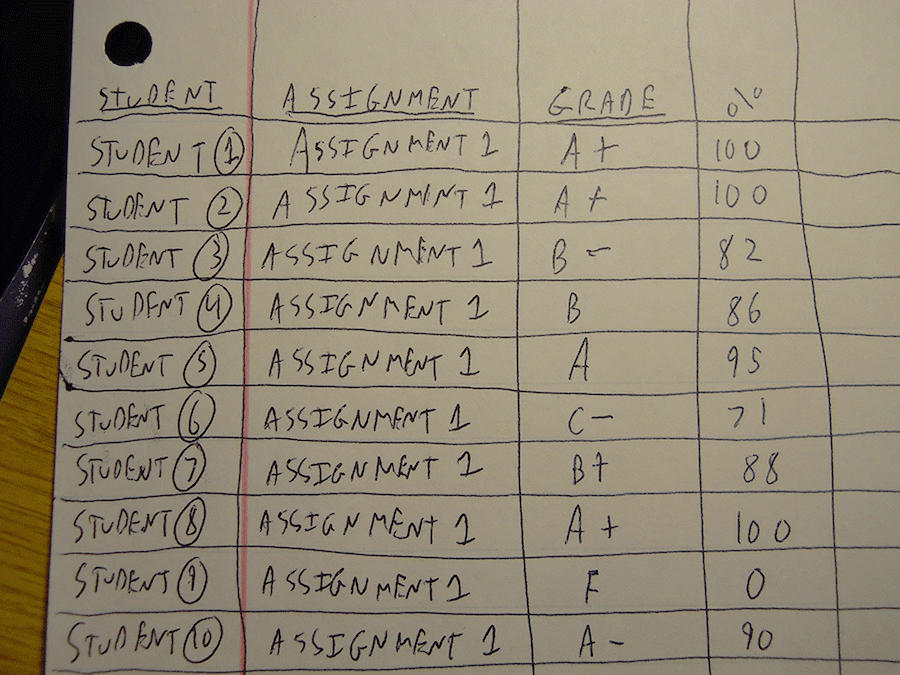Faculty must use Moodle gradebook
At the end of the fall 2016 semester, JSC President Elaine Collins and Interim Academic Dean Sharon Twigg requested that faculty begin using Moodle to post all course syllabi and the Moodle gradebook beginning in the spring 2017 semester. This request was followed by an email to all faculty in January re-stating the request.
Given that a number of faculty have been operating on the traditional old-school written gradebook system for years, it isn’t hard to assume that this request might have come as something unsettling to some instructors. Twigg noted that she received some feedback about the gradebook being hard to set up, something she understands based on her own experiences.
With that in mind, Amy Beattie, JSC online services coordinator, and Robert Gervais, JSC coordinator of instructional technology, will be helping those who may need it with this new policy.
Twigg said that she has already received quite a bit of feedback from faculty who already use Moodle extensively. “They say that it is incredibly useful for them and their students,” she said. “This will allow for students to have easy access to this information, and we’re hoping that these steps will lead faculty to explore some of the additional features of Moodle they might find useful for their classes.”
JSC Senior Brendan Walsh finds it interesting that the gradebook aspect of Moodle is just now being required for classes. “I have had many different experiences with Moodle in conjunction with classes during my time at JSC,” said Walsh. “Some professors have used Moodle extensively for some time now with their courses; I always found that I was receiving more frequent and up-to-date grades and feedback from professors who used Moodle.”
Walsh noted that he has had classes where Moodle was never touched by the professor; and he’s had classes where Moodle was used frequently. “As a student, I think the Moodle gradebook is great, and it also makes sense to upload course syllabi online,” he said. “This way the student body will have ample access to important information that can help them with assignments and due dates without having to worry about their lost paper copy from the first week of the semester.”
For faculty, Twigg said this is an opportunity to further manage and organize course materials, including digital materials for their students; and, with additional ways to engage students using Moodle. For students, she noted that this is an opportunity to stay on top of their course assignments and progress. “This will be an ongoing process as faculty start to provide more information to students via Moodle,” said Twigg.
Similar to Walsh, JSC Sophomore Lily Denmeade and Junior Rhys Keenhold think that it will be great for all professors to have to upload grades on Moodle. “It’s helpful to know what your grades are during the semester so you can have an idea of how you are doing in the class,” said Denmeade. “The only flaw I can think of would be if the instructor didn’t post the grades on Moodle until the end of the semester, because that wouldn’t be very beneficial to students.”
Keenhold added that he never had too much trouble understanding his grades but thinks this is a good idea: “Now whenever I might have forgotten something that has been assigned or want to know what updated grades might be in a more timely manner, I can just check Moodle instead of second guessing myself.”
An avid Moodle user and an assistant professor in the Mathematics Department, Greg Petrics fully supports the initiative to increase the use of Moodle. “Moodle makes for a streamlined one-stop online hub for academic activity,” said Petrics. “The gradebook aspect gives students a reliable way to stay appraised of their progress in their coursework.”
Twigg says that this overall shift can be looked at as taking advantage of technology. “If you lose your syllabus, you know where to find a copy; if you want to know your quiz grades, you can look them up; if you are assigned to view some video clips, you can click on the embedded links,” she said. “Ideally, Moodle could be like a big folder, filled with all the information you need for a course in one place.”
With technology always come some difficulties, as Petrics points out. “For instance, the gradebook can be difficult for faculty to implement unusual grading strategies that they want to employ to best link grades to the coursework they require of students,” he said. “Nonetheless, I believe that the up-side potential fully outweighs the down and look forward to supporting the initiative to increase usage of Moodle across all departments and courses.”
Tyrone Shaw, associate professor in the writing and literature department, said that he understands the reason for the request. “If the Moodle gradebook makes it easier for students to know where they stand in my courses during the semester, I’m happy to use it,” he said. “In the long run, it’s probably going to be easier for me as well. That said, I’ve been reluctant to use this function in the past. Old habits die hard, as they say.”
Looking towards the future, Twigg noted that she doesn’t foresee this policy being discontinued. All schools use learning management systems, and Moodle is what JSC uses. “If you are a student and are unsure of how to access or use any aspect of Moodle, don’t be afraid to ask your instructor or a classmate,” said Twigg. “We all have different experiences, and I don’t expect that everyone is familiar with the technology; but it’s very easy to use after a short introduction.”
Walsh welcomes what is effectively a new policy regarding Moodle, regretting that it didn’t come sooner. “I wish this had been required earlier on at JSC, as now I will be graduating in May, but I know other students will benefit from this decision,” he said.



